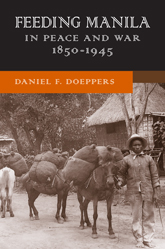Feeding Manila in Peace and War, 1850–1945
Daniel F. Doeppers
New Perspectives in Southeast Asian Studies
Alfred W. McCoy, Thongchai Winichakul, I. G. Baird, Katherine Bowie, and Anne Ruth Hansen, Series Editors
“Outstanding, wide-ranging scholarship shines in every chapter. Doeppers crafts a thoughtful, well-reasoned analysis of provisioning Manila and comparable cities. This is a sterling example of how to investigate and analyze such questions, not only for other parts of the Philippines but elsewhere in Southeast Asia and beyond.”
—Benedict J. Tria Kerkvliet, Australian National University
Policymakers and scholars have come to realize that getting food, water, and services to the millions who live in the world’s few dozen megacities is one of the twenty-first century’s most formidable challenges. As these populations continue to grow, apocalyptic scenarios—sprawling slums plagued by hunger, disease, and social disarray—become increasingly plausible. In Feeding Manila in Peace and War, 1850–1945, Daniel F. Doeppers traces nearly a century in the life of Manila, one of the world’s largest cities, to show how it grew and what sustained it.
Doeppers follows key commodities for the city—rice, produce, fish, fowl, meat, milk, flour, coffee—and their complex interconnections. In the process he considers the changing ecology of the surrounding region as well as the social fabric that weaves together farmers, merchants, transporters, storekeepers, and door-to-door vendors.
 Daniel F. Doeppers is a professor emeritus of geography
and Southeast Asian studies at the University of
Wisconsin–Madison.
Daniel F. Doeppers is a professor emeritus of geography
and Southeast Asian studies at the University of
Wisconsin–Madison.
Praise
“After forty years’ research in the streets of Manila and archives on three continents,
Doeppers has produced a landmark study in the fields of urban history and
human geography. Empirically, this book is the first to chart Manila’s rise from a
small port to a nascent metropolis, spinning a narrative that ends tragically amid
the mass starvation and fiery destruction of World War II. Theoretically, Feeding
Manila offers a pathbreaking analysis of the urban-rural linkages that sustained
this rapid urbanization over the span of a century, illuminating a problem
increasingly critical in a world of hungry megacities. Methodologically, Doeppers
deftly merges a mass of historical documentation into a taut analytical narrative.
In sum, a stunning scholarly achievement.”
—Alfred W. McCoy, author of Policing
America’s Empire: The United States, the Philippines, and the Rise of the Surveillance State
Of Related Interest
|

Policing America’s Empire
The
United States, the Philippines, and
the Rise of the Surveillance State
Alfred W. McCoy |
|

Larger images
January 2016
LC: 2015009224 DS
472 pp. 6 x 9
38 b/w illus., 10 maps, 11 tables, 10 graphs
|

